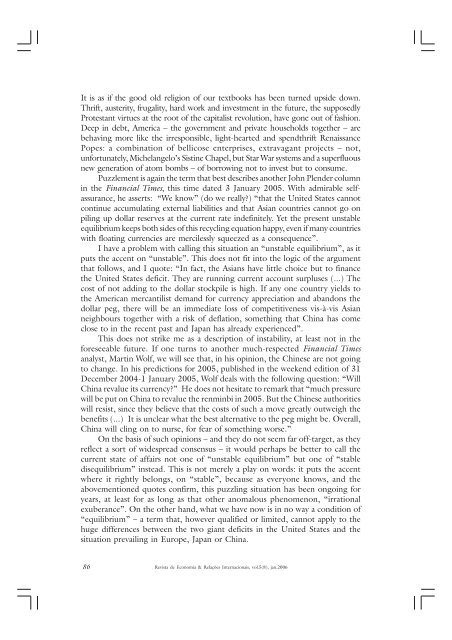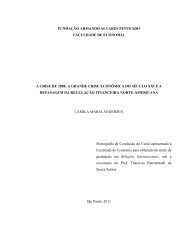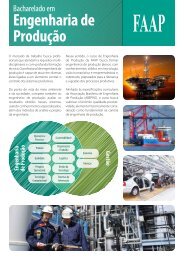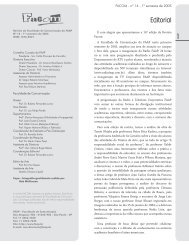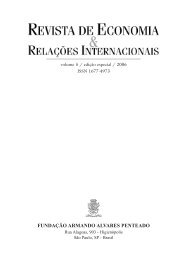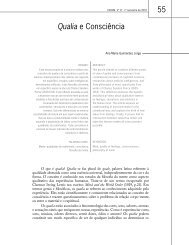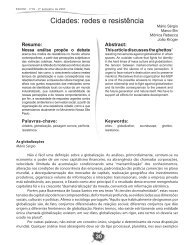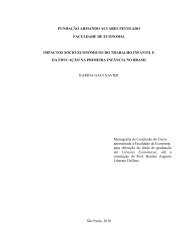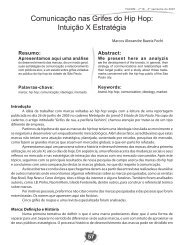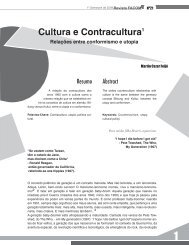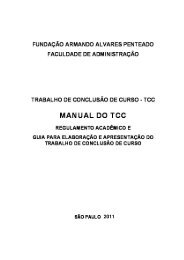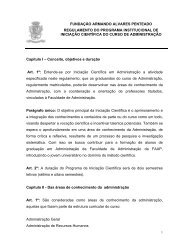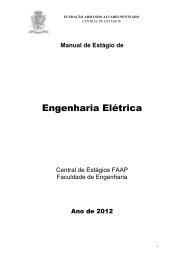Número 8 - Janeiro 2006 - Faap
Número 8 - Janeiro 2006 - Faap
Número 8 - Janeiro 2006 - Faap
Create successful ePaper yourself
Turn your PDF publications into a flip-book with our unique Google optimized e-Paper software.
It is as if the good old religion of our textbooks has been turned upside down.<br />
Thrift, austerity, frugality, hard work and investment in the future, the supposedly<br />
Protestant virtues at the root of the capitalist revolution, have gone out of fashion.<br />
Deep in debt, America – the government and private households together – are<br />
behaving more like the irresponsible, light-hearted and spendthrift Renaissance<br />
Popes: a combination of bellicose enterprises, extravagant projects – not,<br />
unfortunately, Michelangelo’s Sistine Chapel, but Star War systems and a superfluous<br />
new generation of atom bombs – of borrowing not to invest but to consume.<br />
Puzzlement is again the term that best describes another John Plender column<br />
in the Financial Times, this time dated 3 January 2005. With admirable selfassurance,<br />
he asserts: “We know” (do we really?) “that the United States cannot<br />
continue accumulating external liabilities and that Asian countries cannot go on<br />
piling up dollar reserves at the current rate indefinitely. Yet the present unstable<br />
equilibrium keeps both sides of this recycling equation happy, even if many countries<br />
with floating currencies are mercilessly squeezed as a consequence”.<br />
I have a problem with calling this situation an “unstable equilibrium”, as it<br />
puts the accent on “unstable”. This does not fit into the logic of the argument<br />
that follows, and I quote: “In fact, the Asians have little choice but to finance<br />
the United States deficit. They are running current account surpluses (...) The<br />
cost of not adding to the dollar stockpile is high. If any one country yields to<br />
the American mercantilist demand for currency appreciation and abandons the<br />
dollar peg, there will be an immediate loss of competitiveness vis-à-vis Asian<br />
neighbours together with a risk of deflation, something that China has come<br />
close to in the recent past and Japan has already experienced”.<br />
This does not strike me as a description of instability, at least not in the<br />
foreseeable future. If one turns to another much-respected Financial Times<br />
analyst, Martin Wolf, we will see that, in his opinion, the Chinese are not going<br />
to change. In his predictions for 2005, published in the weekend edition of 31<br />
December 2004-1 January 2005, Wolf deals with the following question: “Will<br />
China revalue its currency?” He does not hesitate to remark that “much pressure<br />
will be put on China to revalue the renminbi in 2005. But the Chinese authorities<br />
will resist, since they believe that the costs of such a move greatly outweigh the<br />
benefits (...) It is unclear what the best alternative to the peg might be. Overall,<br />
China will cling on to nurse, for fear of something worse.”<br />
On the basis of such opinions – and they do not seem far off-target, as they<br />
reflect a sort of widespread consensus – it would perhaps be better to call the<br />
current state of affairs not one of “unstable equilibrium” but one of “stable<br />
disequilibrium” instead. This is not merely a play on words: it puts the accent<br />
where it rightly belongs, on “stable”, because as everyone knows, and the<br />
abovementioned quotes confirm, this puzzling situation has been ongoing for<br />
years, at least for as long as that other anomalous phenomenon, “irrational<br />
exuberance”. On the other hand, what we have now is in no way a condition of<br />
“equilibrium” – a term that, however qualified or limited, cannot apply to the<br />
huge differences between the two giant deficits in the United States and the<br />
situation prevailing in Europe, Japan or China.<br />
86 Revista de Economia & Relações Internacionais, vol.5(8), jan.<strong>2006</strong>


